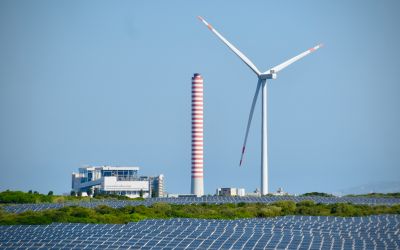Volker Ratzmann on why cooperation between public and private sector is key to reach climate goals
Amid a wide range of crises, the UN Climate Change Conference (COP 27) in Sharm el-Sheikh, Egypt, has pushed the climate back to the top of the global agenda. Volker Ratzmann, Head of Corporate Public Affairs from Deutsche Post DHL Group explains how, and to what extend businesses continue to focus on sustainability, why policymakers need to get moving, and how the market is therefore changing.

Amid a wide range of crises, the UN Climate Change Conference (COP 27) in Sharm el-Sheikh, Egypt, has pushed the climate back to the top of the global agenda. Volker Ratzmann, Head of Corporate Public Affairs from Deutsche Post DHL Group explains how, and to what extend businesses continue to focus on sustainability, why policymakers need to get moving, and how the market is therefore changing.
Volker Ratzmann, you represented Deutsche Post DHL Group at the COP27 in Egypt recently. What was the mood like?
In short, dynamic. It made me think of a hivemind and felt like a huge trade fair at which countless groups – everything from NGOs to multinationals – represented their interests. Political negotiations took place in a separate space, away from the rest of the conference. Basically, the issue of climate protection has moved to the heart of society. As such, it constitutes a core part of the economic activities of practically every large corporation.
As a company, what does Deutsche Post DHL hope to gain from the COP27?
There is hardly a better opportunity not only to listen to discussions about transformation and social development on a global level, but also to shape them. We tried to give impulses to other companies and to promote more cooperation between all social actors. It was also a matter of establishing networks and contacts that can flow back to us.
Did you feel the conference lacked anything?
Yes. COP27’s slogan was "From Ambition to Action." Turning plans into reality in other words. Despite the slogan, I didn’t see nearly enough in the way of real projects yet, such as sustainable aviation fuels.
With the mission to achieve net-zero emissions by 2050 ("Mission 2050"), Deutsche Post DHL Group strives for clean operations for climate protection. To reduce CO2 emissions in line with the Paris Climate Agreement, the Group will spend €7 billion in sustainable fuel and clean technologies by 2030.
To move your targets forward, what do we need to ask of policymakers?
That they create a level playing field. This was discussed at COP27. We need regulation to ensure that "first movers" such as Deutsche Post DHL Group are spared i.e. the extra cost of expensive sustainable fuels or the high taxes on fossil fuels.
What else can businesses do to combat climate change?
They, like us, can lead the way. Show how to implement sustainability in a corporate strategy. And finally, there must be more cooperation between the private and public sectors, but also within the private sector itself.
What might such collaborations look like?
It’s important to look within but also beyond your own industry to find common ground that can be addressed together. For example, a logistics company and a steel producer might have common interests – namely the production of more renewable energy.
Deutsche Post DHL Group is the world's leading logistic company. The Group is home to two strong brands: Deutsche Post is Europe’s leading postal service. DHL offers a comprehensive range of international express, freight transport, and supply chain management services as well as e-commerce logistics solutions. Deutsche Post DHL Group employs approximately 590,000 people in over 220 countries and territories worldwide. The Group generated revenues of more than EUR 81 billion in 2021. With their mission to achieve net-zero emissions by 2050, Deutsche Post DHL strives for clean operations for climate protection. They are doing this by committing themselves to a set greenhouse gas (GHG) emissions target by 2030 in line with the Paris Agreement through the Science-Based Targets initiative (SBTi) and investing €7 billion to reach it. With this investment, they will increase their use of sustainable aviation fuels, design all new buildings carbon neutral, offer a comprehensive portfolio of green products and electrify 60% of their last-mile delivery.
Further information: www.dpdhl.com






